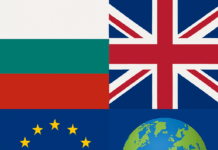By Rumyana Vakarelska Bulgaria’s next government should rethink its Foreign Direct Investment (FDI) and private asset management strategy, following
the forthcoming early elections on 5 October. This will require new approach towards institutional investors, one of Bulgaria’s key sources for foreign direct investment (FDI), as well as towards retail investors among which the Bulgarian ex-pats should not be discounted.
A push towards that is the start of SEE Link, a platform set up for trading securities listed on the respective stock exchanges in Sofia (BSE), Zagreb (ZSE) and Skopje (MSE). SEE Link has been set up by the European Bank of Reconstruction and Development (EBRD) and will be based in Skopje, FYR of Macedonia. The move followed the first historic meeting of the Western Balkan prime ministers earlier this year (pictured) in London, where the Bulgarian presence among partners and investors from Europe and US was not particularly tangible, but at least the country was mentioned as potential partner for quite a few regional projects.
EBRD is providing a €540,000 grant to establish an electronic system for order routing. In parallel, the above participating stock exchanges are extending €80,000 each in capital to strengthen SEE Link, a platform set up for trading securities listed on the respective bourses.
‘SEE Link will standardise and develop financial services in the region, making it more attractive to international investors, including the EBRD’, according to EBRD’s representative Jacek Kubas. ‘Moreover, in Bulgaria, the joint project has already encouraged preliminary investors’ interest’, said Ivan Takev, CEO of the Bulgarian Stock Exchange (BSE). The latter was struggling to attract new IPOs besides managing a well-structured service with some big Bulgarian companies fleeing to the Warsaw Stock Exchange among a few.
International investment trends in CEE and SEE in recent months have clearly demonstrated that Bulgaria’s efforts to attract FDI as part of emerging opportunities in SEE have been insufficient compared to other countries in the region, as well as benefiting from EU’s and international attention that CEE has drawn as a result of the ongoing political and economic crisis in Ukraine.
Having one of the lowest GDPs compared to other EU countries, is not yet an excuse for a lack of ambition on Bulgaria’s behalf to attract both institutional and private investors and here is why.
Ashishkumar Chauhan, the managing Director and CEO of the Bombay Stock Exchange, whom I have recently interviewed in the City of London, said: ‘My ambition is that by 2030 I increase the current 2 pc i.e. (standing for 25 million people) of the Indian population, who are already private investors, to 20pc’.
Under his watch this might well happen, but the key outcome of this extraordinary meeting was his will to win coupled by a long-term strategy, an evidence of which is choosing the Deutsche Borse as the European partner of the Bombay Stock Exchange.
Back to our current situation in Bulgaria, just two weeks ago, many were forced to draw out their savings from First Investment Bank (FIB) and Corporate Commercial Bank (GGB) as a result of the squabble between the two banks’ CEOs, besides that their organisations represent respectively the country’s third and fourth largest lenders.
As a result, a talk about where to keep and where should one invest their savings in Bulgaria, effecting some of the Bulgarian ex-pats, as well, has once again emerged. As the time of the summer holidays has come, given the situation, many account holders living abroad and possibly returning for the summer holidays, will have to soon decide the fate of their own deposits if they still keep bank accounts in Bulgaria.
Many may migrate to the local branches of Raiffeisen Bank or a similar foreign well-established bank, which is unlikely to fall victim of unprofessional and unsustainable exchanges. The EC reacted fast by granting an emergency loan to deal with the merged artificial cash shortages, as customers were cashing out their savings. Bulgarians, who got caught in this situation got not for the first time the sympathies of the ‘Economist’ magazine in an article entitled ‘Digital rumours’, issue 3 July, 2014, luckily avoiding speculations about the sad outcome in the knowledge that Bulgaria has got one of EU’s lowest fiscal deficits.
Surely, after SEE Link’s arrival more grounds have emerged to expect that Bulgarian institutions such as investment agencies and companies will do more to attract new retail investors, especially among the Bulgarians living abroad. Promotional road shows in the City of London and elsewhere in the UK, which a few Bulgarian asset management companies, including the well-structured Bulgarian Stock Exchange, have so far shown little interest in doing so.
Bulgarians abroad have represented the biggest single FDI contributor to the Bulgarian economy for the best part of the last decade, bringing some BGN 1,8 billion an year to the Bulgarian budget, followed well behind by German, Austrian, Dutch, Russian and UK investors alike.
The current political vacuum is a very good time to attract prospective voters on the Bulgarian economy, especially if targeting those over 2 million Bulgarian people working all over the world.
In last year’s general elections, in many places, including Britain, they struggled to cast their votes. One would imagine that will give them a good reason to try to vote again.
Copyright Rumyana Vakarelska
***
Budilnik’s starts a new English Page by Rumyana Vakarelska, Team New Europe
In the knowledge that news and analysis about Bulgaria in the UK press is limited or often biased, ‘Buldilnik’ newspaper has entered a new content partnership with Rumyana Vakarelska, an established City and Whitehall journalist of Team New Europe, an editorial and public affairs consultancy in London. From now on, ‘Budilnik’ newspaper will offer on a regular basis a new English Language Page inside containing original journalistic content in print and online on key developments in Bulgaria and Britain and UK’s ex-pat life to build a higher and well-informed mutual awareness of the two countries and the viable prospects ahead of both.
The English Page will include topics about business, politics, culture and identity that are of specific interest to the Bulgarian UK and world-wide ex-pat community, also known as ‘Drugata Bulgaria’, the Other Bulgaria. The first English Language page came out in the spring, enjoy the rest! May sponsors for the English Language page contact Rumyana Vakarelska by email: rumy.vakarelska















